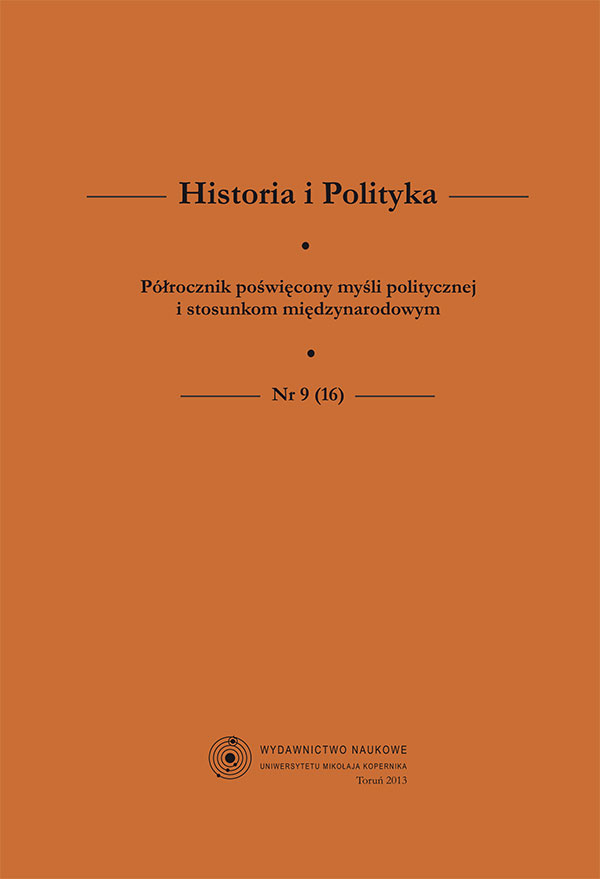Mariusz Kubiak Kulturowe uwarunkowania obronności państwa Siedlce 2012, ss. 369
DOI:
https://doi.org/10.12775/HiP.2013.008Słowa kluczowe
Mariusz Kubiak, uwarunkowania obronności państwa, kultura a bezpieczeństwo, Joanna RakAbstrakt
RecenzjaBibliografia
Arase D., Non-Traditional Security in China-ASEAN Cooperation: The Institutionalization of Regional Security Cooperation and the Evolution of East Asian Regionalism, Asian Survey 2010, vol. 50, nr 4, s. 808–833.
Bäcker R., Nietradycyjna teoria polityki, Toruń 2011, s. 11-13, 83.
Bélanger L., Redefining Cultural Diplomacy: Cultural Security and Foreign Policy in Canada, Political Psychology 1999, vol. 20, nr 4, s. 677–699.
Bislev S., Globalization, State Transformation, and Public Security, International Political Science Review/Revue internationale de science politique 2004, vol. 25, nr 3, s. 281–296.
Davis T. C., Revisiting Group Attachment: Ethnic and National Identity, Political Psychology 1999, vol. 20, nr 1, s. 25–47.
Fearon J.D., Ethnic and Cultural Diversity by Country, Journal of Economic Growth 2003, vol. 8, nr 2, s. 195–222.
Feldman G., Culture, State, and Security in Europe: The Case of Citizenship and Integration Policy in Estonia, American Ethnologist 2005, vol. 32, nr 4, s. 676–694.
Guglielmino C.R., Viganotti C., Hewlett B., Cavalli-Sforza L.L., Cultural Variation in Africa: Role of Mechanisms of Transmission and Adaptation, Proceedings of the National Academy of Sciences of the United States of America 1995, vol. 92, nr 16, s. 7585–7589.
Henrich J., Cultural Transmission and the Diffusion of Innovations: Adoption Dynamics Indicate That Biased Cultural Transmission Is the Predominate Force in Behavioral Change, American Anthropologist 2001, vol. 103, nr 4, s. 992–1013.
Hochberg M.E., A Theory of Modern Cultural Shifts and Meltdowns, Proceedings: Biological Sciences 2004, vol. 271, nr 5, s. S313––S316/
Ilcan S., Phillips L., Governing Peace: Global Rationalities of Security and UNESCO’s Culture of Peace Campaign, Anthropologica 2006, vol. 48, nr 1, s. 59–71.
Johnson C., Kirwan B., Licu T., The Interaction between Safety Culture and Degraded Modes: A Survey of National Infrastructures for Air Traffic Management, Risk Management 2009, vol. 11, nr 3/4, s. 241–284.
Kubiak M., Kulturowe uwarunkowania obronności państwa, Siedlce 2012, s. 7-12, 19, 123, 127, 129, 181, 336, 350..
Mesoudi A., Whiten A., The Multiple Roles of Cultural Transmission Experiments in Understanding Human Cultural Evolution, Philosophical Transactions: BiologicalnSciences 2008, vol. 363, nr 1509, s. 3489–3501,
Parboteeah K.P., Cullen J.B., Social Institutions and Work Centrality: Explorations beyond National Culture, Organization Science 2003, vol. 14, nr 2, s. 137.
Parisi D., Cecconi F., Natale F., Cultural Change in Spatial Environments: The Role of Cultural Assimilation and Internal Changes in Cultures, The Journal of Conflict Resolution 2003, vol. 47, nr 2, s. 163–179.
Reichman S., Hasson S., A Cross-Cultural Diffusion of Colonization: From Posen to Palestine, Annals of the Association of American Geographers 1984, vol. 74, nr 1, s. 57–70.
Becker L., Diallo R., The Cultural Diffusion of Rice Cropping in Cote d’Ivoire, Geographical
Review 1996, vol. 86, nr 4, s. 505–528.
Schafer M., Cooperative and Conflictual Policy Preferences: The Effect of Identity, Security, and Image of the Other, Political Psychology 1999, vol. 20, nr 4, s. 829–844.
Schmitt T.M., Global Cultural Governance. Decision-Making Concerning World Heritage between Politics and Science, Erdkunde 2009, vol. 63, nr 2, s. 103–121.
Strimling P., Enquist M., Eriksson K., Levin S.A., Repeated Learning Makes Cultural Evolution Unique, Proceedings of the National Academy of Sciences of the United States of America 2009, vol. 106, nr 33, s. 13870–13874.
Voss M. D., Whipple j. M., Closs D.J., The Role of Strategic Security: Internal and External Security Measures with Security Performance Implications, Transportation Journal 2009, vol. 48, nr 2, s. 5–23.
Pobrania
Opublikowane
Jak cytować
Numer
Dział
Licencja
Uniwersytet Mikołaja Kopernika w Toruniu respektuje prawo do prywatności i ochrony danych osobowych autorów.
Dane autorów nie są wykorzystywane w celach handlowych i marketingowych. Redaktorzy i recenzenci są zobowiązani do zachowania w poufności wszelkich informacji związanych ze złożonymi do redakcji tekstami.
Autor, zgłaszając swój tekst wyraża zgodę na wszystkie warunki i zapisy umowy licencyjnej (określającej prawa autorskie) z Uniwersytetem Mikołaja Kopernika w Toruniu.
Statystyki
Liczba wyświetleń i pobrań: 527
Liczba cytowań: 0



